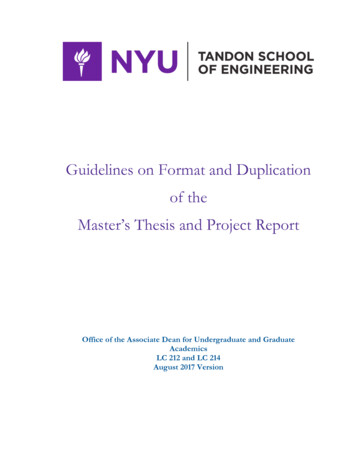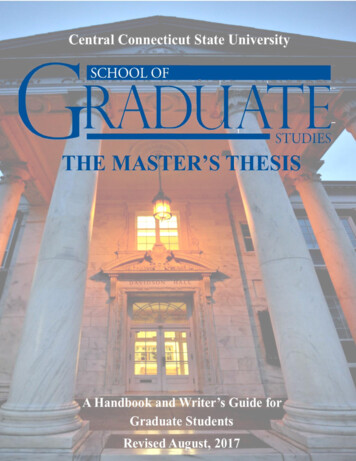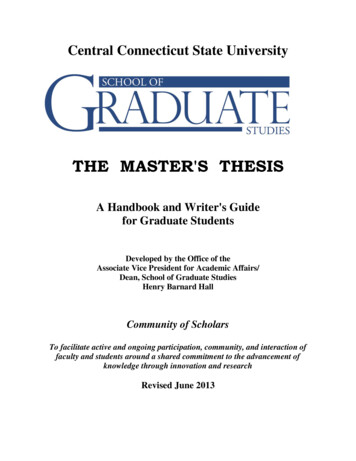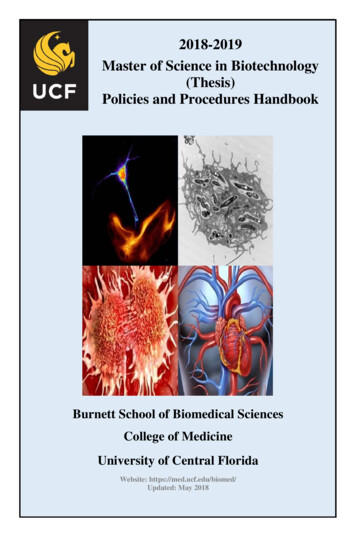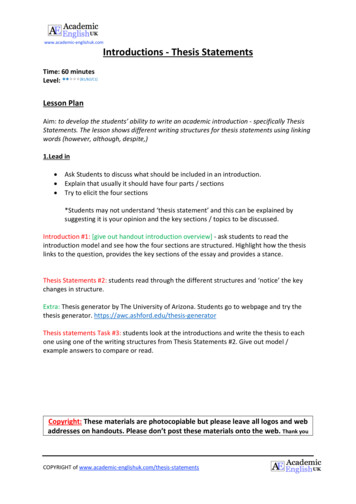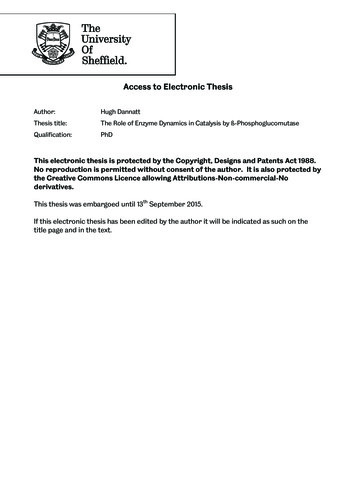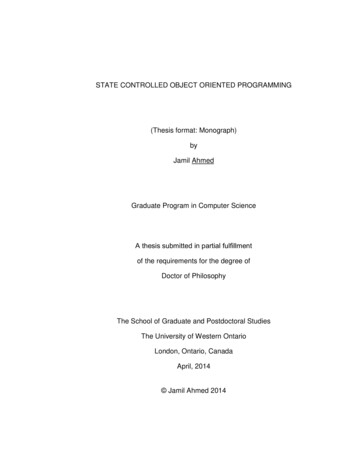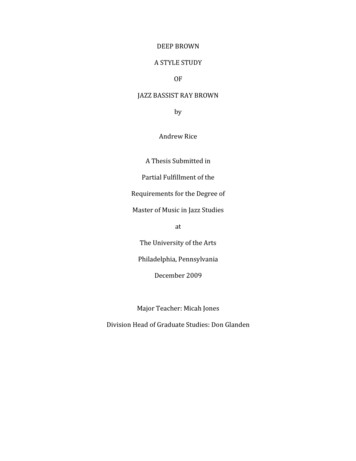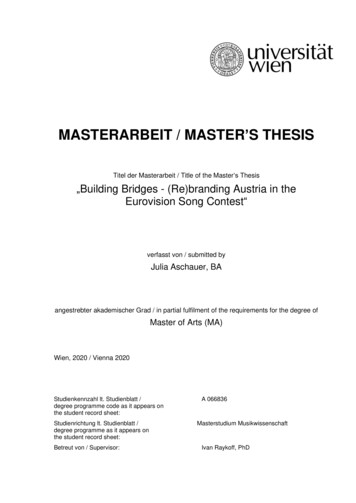
Transcription
MASTERARBEIT / MASTER’S THESISTitel der Masterarbeit / Title of the Master‘s Thesis„Building Bridges - (Re)branding Austria in theEurovision Song Contest“verfasst von / submitted byJulia Aschauer, BAangestrebter akademischer Grad / in partial fulfilment of the requirements for the degree ofMaster of Arts (MA)Wien, 2020 / Vienna 2020Studienkennzahl lt. Studienblatt /degree programme code as it appears onthe student record sheet:Studienrichtung lt. Studienblatt /degree programme as it appears onthe student record sheet:Betreut von / Supervisor:A 066836Masterstudium MusikwissenschaftIvan Raykoff, PhD
2
ForewordIt was the dress rehearsal of the first semi-final of the 59th Eurovision Song Contestin Copenhagen 2014 that I found myself booing 17-year-old girls off the stage, justbecause they were Russian. I - and for that matter hundreds of guests at the show- didn’t agree with the annexation of Crimea by the Russian Federation and Putin’spolitics in general, and let it out on the Tolmachevy twin sisters, quickened by aphenomenon, that I can only call mob mentality. Right at this moment I felt pride andsuperiority at the same time, only to be followed by shame and regret a second later.I realized, that they could have performed literally any song, and no matter howmuch I would have liked it, I wouldn’t have tolerated it, or better said, them. Upsetby these thoughts, that evening left me pondering for a long time. Pondering howand why I felt I had to express my resentment so loudly and so misguided. Thesearch for an answer turned out to be much more complex than I had expected.For the past six years I have followed, studied and celebrated the Eurovision SongContest (ESC). Up to the year 2014, when Conchita gloriously won in Copenhagen,nobody really seemed to care about it in Austria, myself included. I watched it quitesporadically ever since I was little but being born almost 25 years after Udo Jürgens’victory for Austria in 1966, I missed the chance of ever feeling particularlyenthusiastic about it as a child or young adult. So, when I had the opportunity to joina seminar named “Eurovision Song Contest” at university in the summer of 2013, Iwas curious. I have often talked about the “embarrassing” and “corny” contestantsAustria sent over the years, but I never knew anything about what was happeningbehind the scenes. I enrolled because I thought I’d like to learn more about thisannual event everybody seemed to have an opinion on, but nobody really knewabout. Since then, I have never missed a show, I wrote my Bachelor’s thesis on it, Ipresented this thesis at the Eurovision conference in Copenhagen, I went to liveshows, I follow the event around the year and I am now writing my Master’s thesison it. Never had I expected this topic to be so interesting, fascinating, controversial,difficult and delighting. Now I annoy my friends and family with random details, factsand figures when I make them watch it with me every year. It was the biggest and3
most fun part of my academic studies, and for that I want to thank my teacher andpatient advisor Ivan Raykoff. His inspiring lectures, his input and feedback havetaught me so much and helped me understand this colourful world of Eurovision alittle better. I also want to thank Marco Schreuder for his enriching thoughts andhonesty in our interview.Last, but definitely not least, I want to thank my family, who has never pressuredme, and pushed me when I needed to be pushed. I will be forever grateful for yourendless and unconditional support.4
List of FiguresFigure 1: Poster for the Life Ball 2015, Conchita Wurst as Gustav Klimt’s “TheWoman in Gold”, photographed by Ellen von Unwerth, p. 69.Source: t-wirbt-fuer-Life-BallFigure 2: Cover of Andreas Gabalier’s album “Volksrock’n’roller”, p. ions/cds-und-dvds/products/cd-vrrFigure 3: Mission Statement by the ORF for the Eurovision Song Contest inVienna 2015, p. 80.Source: .pdfFigure 4: Traffic lights in Vienna, p. 82.Source: mbole.htmlFigure 5: ESC Hosts 2015, Arabella Kiesbauer, Mirjam Weichselbraun, AliceTumler, p. 85.Source: https://www.youtube.com/watch?v xaET-jXZnFA&t 8258s, screenshot at21:36Figure 6: Interval Act Martin Grubinger & the Percussive Planet Ensemble,Ebensee Glöckler, p. 87.Source: https://www.youtube.com/watch?v xaET-jXZnFA&t 8258s, screenshot at2:30:40Figure 7: Interval Act Ebensee Glöckler, p. 87.Source: https://www.youtube.com/watch?v xaET-jXZnFA&t 8258s, screenshot at2:30:455
ContentForeword3List of Figures5IntroductionI.The Nation and National Identity8131.Nation, Nationality and Nationalism132.Austrian Identity and the First Republic163.Postwar Austria184.Austria and the “Other”20II.Nation Branding221.What is Nation Branding?222.Austrian Brand: Bridge Builder243.Politics, Nationalism and Nation Branding in the Eurovision Song Contest25III.Austrian Identity in Music: Two Concepts321.Musikland Österreich342.Austropop36IV.Austria in the Eurovision Song Contest411.Musikland Österreich (1957 - 1968)422.Austropop (1971 - 1997)483.Nation Branding (1999 – present)553.1. Tradition and Progress: Andreas Gabalier, Conchita Wurst and “Heimat großerTöchter und Söhne”66V.3.2. Austria Hosting the Eurovision Song Contest 201579Conclusion90Sources96Appendix102Lyrics of the Austrian National Anthem102Andreas Gabalier’s open letter on Austria’s National Anthem103Personal interview with Marco Schreuder104Lyrics of the official theme song “Building Bridges”115List of Austrian entries in the Eurovision Song Contest116Abstract120Curriculum Vitae1226
7
IntroductionThe day after the ESC final in Vienna in 2015 everything went back to normal, moreor less. The fans left, posters and banners were taken down and suddenly the citywas quiet again. What was left were same-sex traffic lights, trams carrying the ESClogo and yet another Austrian 0-point entry. It seemed as if Austria was back atsquare one in the Eurovision world. Was Austria able to rebrand and reposition itselfby hosting the ESC, or was it still stuck with old clichés?Stereotypes often manage to create a distorted image of a nation, and in the caseof Austria, classical music seems to be the number one cliché the country is brandedwith. Brahms, Bruckner, Haydn, Schubert, Strauss, Mozart and many more are thepillars upon which Austria’s cultural heritage rests. Paired with a romanticized ideaof imperial times, castles and Austria’s snowy, alpine landscape, one might wonderhow Austria could possibly overcome such an antiquated image, to fully arrive in the21st century and to present itself as a modern, versatile nation.The international perception of Austria might have changed on May 10th, 2014.When Conchita Wurst was crowned ‘Queen of Europe’, people saw Austria in adifferent light - maybe for the first time. Austria sent a contestant that presented amodern, liberal, progressive, accepting-of-all-lifestyles, open-minded and most of alltolerant nation. But ever since her participation at the ESC 2014 was confirmed,disturbing attempts to boycott her appearance and many torrents of hatred surfacedon the internet. There was an Anti-Conchita-Wurst-petition on Facebook addressedagainst the ORF and its choice to send the travesty artist to Copenhagen withoutgiving the Austrian population the chance to vote for other contestants. In theiropinion, the ORF should have let the taxpayers choose a singer for the ESC. Yet,the many homophobic and transphobic comments are evidence, that “the realmotivation for these protests was the fact the ORF had chosen a performer who wasnot unambiguously male or female.”1 Many of these voices fell silent after she won,but the general tone during that time was sceptical. Another reason for people’s1Ivan Raykoff: “Austria, ORF, and Conchita Wurst” in: ORF Texte 2015, p. 35.8
doubts might have been the fact that Austria was so very unsuccessful in the pastdecades, that they thought it was a ridiculous attempt to try something new and“being different” by coming up with someone so polarising.For the first time in a long time, Austria was in the focus of attention in the ESCworld. By sending such an extraordinary contestant and then having the opportunityto host the ESC the following year, Austria had the chance to redefine itself, and tofinally get rid of antiquated clichés. Despite the immense cost to host the ESC, itwas an invaluable opportunity; the time-dependent effect the ESC can have for thehost country outshines the unavoidable financial sacrifice.2 The ORF’s missionstatement, in which many things of what the ESC in Vienna would and would not bewere listed, was a celebration of a cosmopolitan and diverse host-city. But trying torepresent a nation as modern and tolerant can be a delicate issue when being facedwith a crisis that goes beyond the country’s frontiers. When the country had to dealwith tens of thousands of refugees at the southern border only a couple of weeksafter the ESC was held in Vienna, Austria didn’t build a bridge, it built a fence toSlovenia. It was quite clear that there was a vast discrepancy between the imagethat is being promoted inside and outside the “Eurovision-Bubble.”The first image of the contest in Vienna in 2015 that one could see on TV - afterhearing the Eurovision Hymn - was the Vienna Philharmonic Orchestra playing infront of Schloss Schönbrunn (at this exact spot in 1967 the waltz “Wiener Blut” wasperformed). What seamlessly blended into the classical music canon of greatcomposers born in Austria reconfirmed one’s view of the nation and its musicaltraditions. This was the moment when orchestral music was reintroduced to the ESCafter a long period of absence, at least for the opening. Ninety seconds laterConchita’s victory of 2014 appeared on screen. Soon, after seeing pictures ofAustrian landscapes and landmarks, people in Dirndl and Lederhosen playingtraditional Volksmusik, people dressing up as Mozart, men dressing up as women,people going hot air ballooning and skiing, dancing ballerinas, young people in a hipclub, a Formula 1 car racing in circles, typical Viennese coffeehouses, and theViennese Prater, it was quite clear what message Austria wanted to send out that2Irving Wolther, Kampf der Kulturen: Der Eurovision Song Contest als Mittel national-kulturellerRepräsentation, Würzburg: Königshausen & Neumann 2006, p. 140.9
night: This country was a place where old traditions can live alongside new andmodern lifestyles. Old and new have an equal right to exist, and, furthermore, theycan complete each other.Representing Austria as a very diverse, modern nation when hosting the ESC, isonly one part of the equation. What about cultural heritage when it comes tochoosing a contestant? If winning is the main priority, what roles do language,traditions and national values play? Do they even stand a chance against modernand mainstream music that goes with the spirit of time?Apart from a trophy and earning the right to host the next ESC, there are no materialrewards for winning, yet the hope for commercial success and an internationalcareer attracts many artists to try their luck.3 In the first years of Eurovision, Austriasent songs about waltz, Viennese air and nostalgia. Yet, reminiscing about bygoneimperialistic times, when the Austrian empire was large and of significance, was nolonger the status quo. Austria still needed to find its place in a postwar world, andget rid of its bad reputation, molded by the Nazi regime. The double sidedness ofAustria’s role in WWII - being a victim and responsible at the same time - has beenresonating in the representation of Austrian identity ever since. As an annual event,the ESC is an opportunity to showcase national identity and reshape theinternational perception of Austria.4The purpose of this paper is to display the ways Austria used the Eurovision SongContest as an opportunity to brand itself as a bridge builder and to reposition itselfin a post war Europe. By analysing Austria’s contestants throughout the years I’dlike to try to explain how Austrian identity was represented and how it correlates withthe aim of winning. I want to show what has happened in the one year Austria tookcenter stage in the ESC world, after Conchita Wurst had won, and how this newfound self-esteem helped to reinvent the nation’s image, where classical music andalpine landscapes have dominated the international perception of this small, centralEuropean country for a long time.34Dean Vuletic, Postwar Europe and the Eurovision Song Contest, London: Bloomsbury 2018, p. 1.Ibid., p. 62.10
In the process of writing this paper the topic had taken on many different directions,as new questions arose. Including 2019, Austria has participated 52 times in theESC, which means 52 different identities, personalities and songs - finding a leitmotifis nearly impossible. Just like a nation’s brand, that tries to catch the essence,identity can’t be generalized as one homogeneous adjective or noun to describewhat is in fact Austrian. Yet, researching national identity represented in music canhelp to understand the challenge that a country like Austria, with a rich (classical)musical history, has to face. Its cultural reputation precedes Austria, which on theone hand helps its international prestige, but on the other hand pressures thecreative scene to maintain a high standard. The burden of living up to its namebecomes apparent in the ESC year after year. For a long period of time, the ESCwas dismissed as irrelevant in Austria, but with Conchita’s victory Austria’sperspective has changed overnight.To get more information on the terminology of nation and identity, I start with anapproach of definition, based on Benedict Anderson’s book Imagined Communities,moving on to Austria’s history since the First
sporadically ever since I was little but being born almost 25 years after Udo Jürgens’ victory for Austria in 1966, I missed the chance of ever feeling particularly enthusiastic about it as a child or young adult. So, when I had the opportunity to join a seminar named “Eurovision Song Contest” at university in the summer of 2013, I was curious. I have often talked about the .


